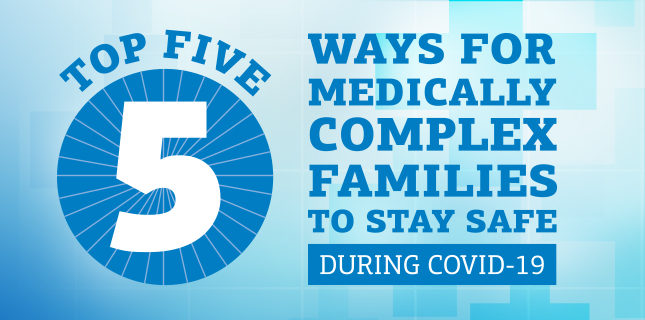Across the nation, health care organizations are rapidly changing processes and updating protocols to keep patients and staff safe as COVID-19 evolves. Amidst the mountain of stories, videos, and articles available on the virus, it can be hard to find information on one of the most vulnerable populations, medically complex children. Pediatric Home Service Medical Director, Dr. Roy Maynard, has pulled together his list of the top 5 actions families with medically complex kids can take to protect their child and family throughout this pandemic. We’ve also thrown in a couple of bonus topics and resources that apply specifically to the medically complex population because we just couldn’t narrow it down to only 5.
Top 5 Ways for Medically Complex Families to Stay Safe During COVID-19

1) Practice Social Distancing
Continue to be vigilant about social distancing and limit the number of people who come into your environment or engage with your child. While the safe at home orders have been in place for what feels like quite some time, social distancing is still one of the best measures we have for limiting the spread and avoiding infection. This includes ensuring all members of the household are properly protecting themselves if they must go out in public. If available to you, utilize grocery delivery services to avoid the necessary trips to the grocery store.
Missing your family and friends? Try video calls through apps like Houseparty where you can play games right in the video call, or Zoom. Both are free.
2) Wash and Reuse Appropriate Supplies
While it is unknown the impact Coronavirus will have on long term supply chains, we’re already seeing short-term backorders with the increased demand for respiratory equipment and supplies to treat COVID-19 patients nationwide. To ensure you don’t run out of a crucial supply, PHS is urging families to avoid throwing away any supplies that can be safely washed and reused. As always, we will be working to find suitable replacements for any and all long-term backorders and will communicate shortages as we become aware of them. At this point (April 30, 2020), there are no indications of long-term supply limitations as a result of plant closure overseas. Inventory and deliveries are very fluid right now with updates happening sometimes by the hour. Our priority is the safety and access to necessary equipment and supplies for our patient families. Please reach out if you have concerns about any of your supplies from PHS. Please visit the PHS Coronavirus pages for information on washing and reusing supplies.
3) Emergency Planning
While we all know that medically complex patients fall into a category of the population who are considered to be at an increased risk due to underlying health conditions, it can be easy to overlook that many of our patient’s caregivers are also at risk. Whether it is parents who are older, or grandparents who serve as part or full-time caregivers, it is equally as important to have emergency plans in place should anyone in your household become sick and require hospitalization or extended care.
Ensure you have an up to date emergency plan in place for all members of your household. Include contingency plans for care of children in addition to common questions that would be asked by medical professionals. Print out and use the PHS EMS checklist to get started.
4) Adequate (not hoarding) Stock of Supplies and Medicines
Now is the time to check supplies throughout your house. Ensure you rotate through supplies in your emergency bag, and any additional back-up supplies you have on hand to avoid expiration. Order enough to keep around a 30 day supply of all critical items. PHS will always work to identify safe alternatives that align with you care plan should backorders arise, but having the appropriate stock on hand will help to avoid undue stress.
5) Utilize Telehealth
Many providers are now offering telehealth options to limit unnecessary in-person visits. If you have an upcoming appointment, call your provider and see if the visits can take place online. While not possible in all cases, this would save your time for travel and risk of exposure while at the hospital or clinic.
Bonus topics:
- Wash Your Hands. All. The. Time.
- This goes without saying at this point, but there cannot be a list out there about prevention of COVID-19 that doesn’t include hand washing. This is by far the best way for you to stop the spread of the virus in your home. Looking for a good chuckle? Check out this fun video on handwashing from a PHS staff meeting many years ago, then, for the real deal, you can watch the PHS education version of handwashing.
- Mental Health
- While this topic didn’t make the top 5 list, it is critical that you make time to check in with yourself throughout this time to ensure you stay healthy and well and are able to continue to provide care for your child. PHS social worker shared a link to the Minnesota Association for Children’s Mental Health resource center. which contains numerous resources that families can access while at home to help navigate the stress and trauma being felt by many.
What other tips or information would you share with other patient families? Let us know in the comments, we’d love to hear from you.
 Roy C. Maynard, M.D., is the Medical Director for PHS. He works with the team to provide consultation and advice to ensure quality and effective care to children and their families in their own homes. Alongside the Chief Clinical Officer, he also leads the implementation of clinical policies, procedures and programs to further enhance the best possible care for each child. He is a Neonatologist and Pediatric Pulmonologist and serves as a staff physician at Children’s Hospitals and Clinics in Minneapolis, Minn.
Roy C. Maynard, M.D., is the Medical Director for PHS. He works with the team to provide consultation and advice to ensure quality and effective care to children and their families in their own homes. Alongside the Chief Clinical Officer, he also leads the implementation of clinical policies, procedures and programs to further enhance the best possible care for each child. He is a Neonatologist and Pediatric Pulmonologist and serves as a staff physician at Children’s Hospitals and Clinics in Minneapolis, Minn.

